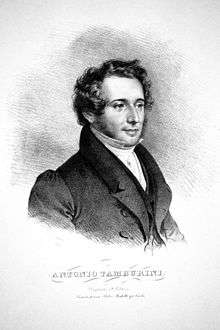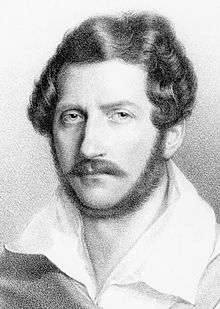Alahor in Granata
Alahor in Granata is an opera in two acts by Gaetano Donizetti to an anonymous Italian libretto (indicated only with the initials "M.A.") after Jean-Pierre Claris de Florian's text Gonzalve de Cordoue, ou Granade reconquise (1793). However, it seems that the original basis of the libretto goes back to one by Felice Romani written for Meyerbeer in 1821, which in turn can be traced back through another iteration to begin with the de Florian version.[1]
While Donizetti was spending most of 1825/26 in Palermo as musical director of the Teatro Carolino, Alahor in Granata was written to be presented in December 1825, but the premiere was delayed until 7 January 1826 and given at the Teatro Carolino with critical and popular success.
Performance history
The score was eventually lost, but a copy – "not in the composer's hand"[1] – was subsequently discovered in Boston in 1970. Finally, the autograph score came to light a few years later in Palermo.[1] Some of the music was recycled into Emilia di Liverpool in 1828 and L'Elisir d'amore in 1832.
The first contemporary production, in Seville in 1998, has been preserved on DVD.
Roles

| Role | Voice type | Premiere cast, 7 January 1826 (Conductor: – ) |
|---|---|---|
| Zobeida, daughter of Mohamed, sister of Alahor | soprano | Elisabetta Ferron |
| Alahor, son of Mohamed | baritone | Antonio Tamburini |
| Muley-Hassem, King of Granata | contralto | Marietta Gioia Tamburini |
| Sulima, favorite slave of Zobeida | mezzo-soprano | Carlotta Tomassetti |
| Alamar, head of the tribe | tenor | Berardo Winter |
| Ismaele, false friend of Alamar | tenor | Salvatore Patti |
| Tribesmen, soldiers, people | ||
Synopsis
- Time: The middle ages
- Place: Granada
Recordings
| Year | Cast (Alahor, Zobeida, Hassem, Alamar) |
Conductor, Opera house and orchestra |
Label[2] |
|---|---|---|---|
| 1998 | Simone Alaimo, Patrizia Pace, Vivica Genaux, Juan Diego Flórez |
Josep Pons, Orquesta Ciudad de Granada and Chorus of Teatro de la Maestranza de Sevilla (Recorded at performances in Seville, October) |
CD: Almaviva Cat: DS 0125 |
References
Notes
- Osborne 1994, p. 161
- Source for recording information: Recording(s) of Alahor in Granata on operadis-opera-discography.org.uk
Cited sources
- Osborne, Charles, (1994), The Bel Canto Operas of Rossini, Donizetti, and Bellini, Portland, Oregon: Amadeus Press. ISBN 0-931340-71-3
Other sources
- Allitt, John Stewart (1991), Donizetti: in the light of Romanticism and the teaching of Johann Simon Mayr, Shaftesbury: Element Books, Ltd (UK); Rockport, MA: Element, Inc.(USA)
- Ashbrook, William (1982), Donizetti and His Operas, Cambridge University Press. ISBN 0-521-23526-X
- Ashbrook, William (1998), "Donizetti, Gaetano" in Stanley Sadie (Ed.), The New Grove Dictionary of Opera, Vol. One. London: Macmillan Publishers, Inc. ISBN 0-333-73432-7 ISBN 1-56159-228-5
- Ashbrook, William and Sarah Hibberd (2001), in Holden, Amanda (Ed.), The New Penguin Opera Guide, New York: Penguin Putnam. ISBN 0-14-029312-4. pp. 224–247.
- Loewenberg, Alfred (1970). Annals of Opera, 1597–1940, 2nd edition. Rowman and Littlefield
- Sadie, Stanley, (Ed.); John Tyrell (Exec. Ed.) (2004), The New Grove Dictionary of Music and Musicians. 2nd edition. London: Macmillan. ISBN 978-0-19-517067-2 (hardcover). ISBN 0-19-517067-9 OCLC 419285866 (eBook).
- Weinstock, Herbert (1963), Donizetti and the World of Opera in Italy, Paris, and Vienna in the First Half of the Nineteenth Century, New York: Pantheon Books. LCCN 63-13703
